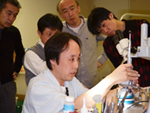2010年5月30日 - 2010年6月 5日 « トップへ » 2010年6月13日 - 2010年6月19日
2010年6月11日
The alignment of my false teeth is off. What negative consequences can I expect? (man in his 40s)
Q. I am in my mid 40s and almost all of my teeth are false teeth. If the alignment of my false teeth is off, what kinds of negative consequences can I expect? I get stiff shoulders and headaches and I am wondering if this is the reason.
A. By false teeth, I am assuming that you mean that most of your teeth are crowned? If you treat each tooth individually, there is a good chance that the balance of your mouth is off.
Your upper and lower teeth work together in balance and harmony. If you continuously require crowns to be put in one by one because of cavity or nerve treatment, eventually, your original tooth configuration is going change drastically. For example, the height of your left and right bite alignment could differ, and the size of your teeth can differ as well. So it is important to avoid treating your teeth one by one. Rather, you should seek treatment for all of them as a unit keeping balance in mind.
So you have asked, "If the alignment of my false teeth is off, what kinds of negative consequences can I expect?"
There are many people with this condition who complain of the following symptoms: "I cannot open my jaw widely", "The joints in my jaw hurt", and also, "My neck hurts", "I have stiff shoulders", "My back hurts", "My hands and legs go numb", "My ears are ringing", "I get bad migraines". These are the most common symptoms I hear. Most of them are similar to symptoms of TMJ arthrosis.
TMJ arthrosis is a condition in which the area around the jaw hurts, opening the mouth becomes difficult, and a clicking, scraping, or popping noise can be heard coming from the jawline area. There are many causes of TMJ arthrosis such as having poor tooth alignment, or poor bite alignment balance due to wisdom teeth. It is especially common to see this ailment caused by silver crowns, fillings, or dentures that throw off the balance of one's bite alignment. First, it is necessary to have your bite alignment examined to make sure that it is correct (this is called occlusion diagnosis). Through occlusion diagnosis you can learn about your bilateral balance, and whether or not there is shifting about your body's central axis. It is very important to accurately adjust your bite alignment plane.
2010年6月 9日
I want to get invisible clasp dentures not through insurance. (woman in her 30s)
 Q. I had to get teeth numbers 6 and 7 in my upper right jaw, and teeth numbers 5, 6, and 7 in my lower left jaw removed due to cavities, so now I have dentures. I hate that people can see the metal clasps on my dentures. I want to get invisible clasp dentures not through insurance. (woman in her 30s)
Q. I had to get teeth numbers 6 and 7 in my upper right jaw, and teeth numbers 5, 6, and 7 in my lower left jaw removed due to cavities, so now I have dentures. I hate that people can see the metal clasps on my dentures. I want to get invisible clasp dentures not through insurance. (woman in her 30s)
1. What are those silicon false teeth that don't require metallic clasps?
2. Do dentures with metal clasps last longer than those without?
3. I read somewhere that when it comes to biting, smile dentures are less effective than dentures covered by insurance and that using them causes your jaw to look emaciated. Do you know anything about this?
Thank you for your answers.
A. Partial dentures covered by health insurance have metal clasps that hook onto your remaining teeth. Also, everyone can tell that you are wearing them. In recent years many people are choosing to pay for dentures themselves for these reasons.
1. What are those silicon false teeth that don't require metallic clasps?
These dentures use silicon springs that grip to the base of your tooth around the gum line instead of the conventional metal springs. It is true that they are esthetically pleasing, but biting strength is sacrificed. This is because retention force is weak, which causes the dentures to move around a lot. Not to mention, it is rather easy for food particles to be caught between the springs and the gum line.
Also, these dentures put a lot of stress on remaining teeth due to membrane subduction of the dentures when biting (compared to the part of your mouth with teeth, the gums experience 1 - 2 millimeters of subduction like a cushion). The teeth take on a lot of the burden and it is possible that in the future one may lose more teeth because of this. Also, these types of dentures are relatively new and there is no evidence as to how long they last.
2. Do dentures with metal clasps last longer than those without?
Dentures with metal clasps last up to 7 years. Actually, this is the normal case for teeth that still have nerves. If your teeth are missing nerves then they may become lose after only a few months.
3. I read somewhere that when it comes to biting, smile dentures are less effective than dentures covered by insurance and that using them causes your jaw to look emaciated. Do you know anything about this?
When your dentures move, your jaw bone absorbs the shock. Therefore, this is definitely possible. In recent years, it has become easy to produce non-clasp type silicon dentures and smile dentures, and these kinds of cheap dentures are increasing. However, they have little history and there are no reports concerning long-term case studies. These types of dentures almost all lack a rest. A rest is a piece that transmits force. It transfers force to the tips of the teeth roots. Clasps are necessary to keep the false teeth in place, but you should really prioritize the rest piece. It is important to have your teeth examined using a 3-D method.
So what happens if your dentures do not have a rest? Not only will your jaw lose muscle, but your teeth will wiggle and you may end up losing more within a few years. At first look, these new, cheap dentures are quite beautiful, but in the long term, I think that people who use them may regret it.
At our clinic we recommend the telescope system, which are dentures that have more than 120 years of history in Germany. And since metal parts are invisible do to our superior technology and materials, these dentures are quite popular with younger people.
 Since the retentive mechanism of these dentures does not rely on metal springs, it takes about 3 months after treatment before you can actually put them on (Of course we can provide false teeth in the meantime so that you can pass the time without worrying). This is because the manufacturing process and the technology is extremely precise (There are very few dentists and dental technicians in Japan who can use this incredibly precise technology).
Since the retentive mechanism of these dentures does not rely on metal springs, it takes about 3 months after treatment before you can actually put them on (Of course we can provide false teeth in the meantime so that you can pass the time without worrying). This is because the manufacturing process and the technology is extremely precise (There are very few dentists and dental technicians in Japan who can use this incredibly precise technology).
Since the dentures do not move around in your mouth, there is very little force being absorbed into your jaw and your remaining teeth are protected further by being held firmly in place. Once you put these dentures on, you can enjoy them as a part of your own body for at least 10 years.
Since the telescope system allows for adjustments, some of our clinic's patients have had the same pair of dentures for over 30 years!
Whether you end up losing your teeth or protecting them over the next 10, 20, or 30 years is a matter of what kind of dentures you choose. We urge you to think carefully about this very important decision.
What is the Telescopic System?









